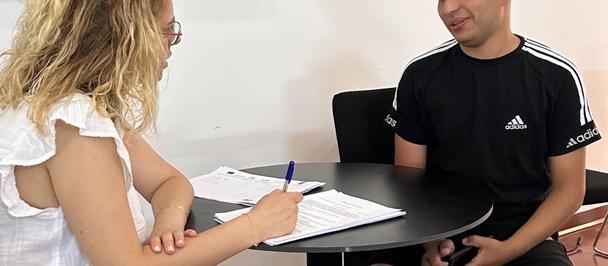UNDP Albania
Promise to Fatjona: No One Left Behind
February 5, 2025
Have you ever walked into a room and found your gaze drawn to one person, the one whose eyes seem to hold a universe of unspoken stories? That’s Elona!
The moment I met her, she hugged me—small arms wrapping around me with a fragile and fierce warmth.
Elona is just eight and a second grader at Muhamet Shehu School in Patos. Her childhood has been anything but ordinary.
When Elona was only a year old, her mother walked away. Since then, her grandparents, despite their age and frailty, have done everything in their power to raise her. Their love is immense, but their resources are limited. The municipality has provided some support—free daycare and social housing. Yet, Elona needs specialized development and rehabilitation services to increase her potential for autonomy and independence.

The new community center in Patos.
A thread of hope emerged when a new community center was established in Patos. For the first time, children with disabilities and other vulnerable groups have access to specialized care that was once out of reach. Psychologists, social workers, and physiotherapists work together to ensure that no child like Elona is left behind.

The new community center in Patos.
For the past two months, she has been receiving treatment. An individual plan has been designed for her. She now comes to the center three times a week. Her grandparents, exhausted but determined, accompany her to school and bring her to the Multifunctional Center, where she receives the care she so desperately needs.

Elona's grandmother accompanying Elona to the Multifunctional Center in Patos.
The new community center in Patos is established by UNDP in the context of the United Nations Joint Programme "Leave No One Behind" (LNB) Phase 2. The project is funded by the Swiss Agency for Development and Cooperation (SDC) and implemented in partnership with the Government of Albania and four UN agencies—UNDP, UNFPA, UNICEF, and UN Women.
Through the LNB Programme, UNDP has helped the Municipality of Patos develop a Local Social Care Plan—essential for ensuring that every citizen, especially those from marginalized communities, receives the support and services they need.
On the other hand, UNICEF has worked to strengthen the capacity of municipal staff to deliver social services more efficiently and inclusively.
For Elona’s grandparents, the impact is already visible. At the center, she is no longer just a child struggling with trauma—she is a little girl receiving targeted therapy, socializing with peers, and rediscovering joy. Her grandparents, once overwhelmed with worry, now see hope.
The center in Patos is one of 15 established across Albania with UNDP’s support through the programme. These centers are a vital resource for around 400 children with disabilities, who have long struggled to access such essential services in their communities.
As I left the center that day, Elona waved goodbye. And in her eyes, I saw something new: a flicker of possibility.
For Elona—and for so many others—this center is not just a building. It’s a promise. A promise that no one will be left behind.

At its core, the Leave No One Behind programme is more than just a policy initiative—it is a commitment to transforming lives. By strengthening Albania’s social protection system, the programme ensures that vulnerable citizens and marginalized groups receive the quality, integrated social services they need. Rooted in national reforms on social care, the LNB2 is designed to bridge the gap between policy and real impact, fostering a society where no one—regardless of gender, background, or circumstance—is left behind.
Through a systemic approach, it builds stronger social services, empowering communities and creating opportunities for those who need them most.

 Locations
Locations



